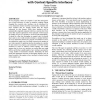Free Online Productivity Tools
i2Speak
i2Symbol
i2OCR
iTex2Img
iWeb2Print
iWeb2Shot
i2Type
iPdf2Split
iPdf2Merge
i2Bopomofo
i2Arabic
i2Style
i2Image
i2PDF
iLatex2Rtf
Sci2ools
PPPJ
2006
ACM
2006
ACM
Cost and benefit of rigorous decoupling with context-specific interfaces
In Java programs, classes are coupled to each other through the use of typed references. In order to minimize coupling without changing the executed code, interfaces can be introduced for every declaration element such that each interface contains only those members that are actually needed from the objects referenced by that element. While these interfaces can be automatically computed using type inference, concerns have been raised that rigorous application of this principle would increase the number of types in a program to levels beyond manageability. It should be clear that decoupling is required only in selected places and no one would seriously introduce a minimal interface for every declaration element in a program. Nevertheless we have investigated the actual cost of so doing (counted as the number of new types required) by applying rigorous decoupling to a number of open source Java projects, and contrasted it with the benefit, measured in terms of reduced overall coupling. ...
| Added | 14 Jun 2010 |
| Updated | 14 Jun 2010 |
| Type | Conference |
| Year | 2006 |
| Where | PPPJ |
| Authors | Florian Forster |
Comments (0)

